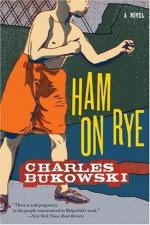|
This section contains 513 words (approx. 2 pages at 400 words per page) |

|
Ham on Rye Summary & Study Guide Description
Ham on Rye Summary & Study Guide includes comprehensive information and analysis to help you understand the book. This study guide contains the following sections:
This detailed literature summary also contains Topics for Discussion and a Free Quiz on Ham on Rye by Charles Bukowski.
Henry says his first memory is of being under something. He thinks it was a table. It was 1922 in Germany, and he was between one and two years old. His memories are spotty and among them is food. He says people were "always eating". Then the entire family is in America. He has limited contact with his grandmother and almost none with his grandfather. Henry's life consists of both a series of beatings at the hands of his father, Big Henry, and the disinterest of a timid mother.
Henry is forbidden to interact with other children in the neighborhood. His parents feel that the other children are poor and beneath Henry, though they barely struggle through the Depression themselves. Henry breaks away from that to some degree, and does eventually manage to make some friends although he himself always drives them away. When Henry is still very young, he's put to work mowing the lawn each Saturday. He has just begun to make friends with some other boys in the neighborhood and now misses out on their Saturday play time. When he finishes mowing, his father gets on his hands and knees to check for "hairs"—any stray weeds that are sticking up above the accepted level of the grass. For any hairs, Henry is beaten with a razor strop. He says that it's simply accepted that he's to be beaten each week.
Henry still manages to have some friends in the neighborhood, and has just begun to fit in when his father forces him to transfer to Chelsea High—a school traditionally attended by children of wealthy families. There, Henry is again an outcast, though he's joined by several other outcasts. Henry graduates and begins working as a stock clerk at a department store. He says that the "caste system" is alive and well and that the stock clerks are lower than the store clerks and unworthy of their notice. After just a week at the job, Henry is taunted by former classmates and beats one of them up, prompting his boss to fire him.
Henry's father then sends Henry to college because tuition is free, used books are cheap, and having a son in college is more acceptable than having a son without a job. At the advice of a friend, Henry takes journalism because he believes it will be easy. He sells his books, buys booze, and falls into a routine of drinking. His father finds some short stories Henry has written and throws him out of the house for the content.
Henry moves out, makes money by writing term papers for other students and by gambling, and prepares himself for a life on skid row once he quits college. He meets up with a former college classmate, Becker, who is now in the Marines. The two are having a drink when news comes that Pearl Harbor has been bombed. Henry and Becker part and Henry goes to a penny arcade where he loses two games of robotic boxing against a young Mexican boy.
Read more from the Study Guide
|
This section contains 513 words (approx. 2 pages at 400 words per page) |

|



